Ah, the quintessential dream of every homeowner – a lush, vibrant lawn that’s the envy of the neighborhood. But as any seasoned gardener knows, achieving that level of lawn perfection is no easy feat. It takes patience, dedication, and a bit of insider knowledge to transform your outdoor space into a verdant oasis.
Fear not, my friend, for I’m here to share the secrets of the lawn care masters. From selecting the right grass type to nourishing your soil and combating pesky pests, this comprehensive guide will equip you with all the tools you need to cultivate a backyard masterpiece. So grab your gardening gloves, and let’s dive into the wonderful world of lush, envy-inducing lawns!
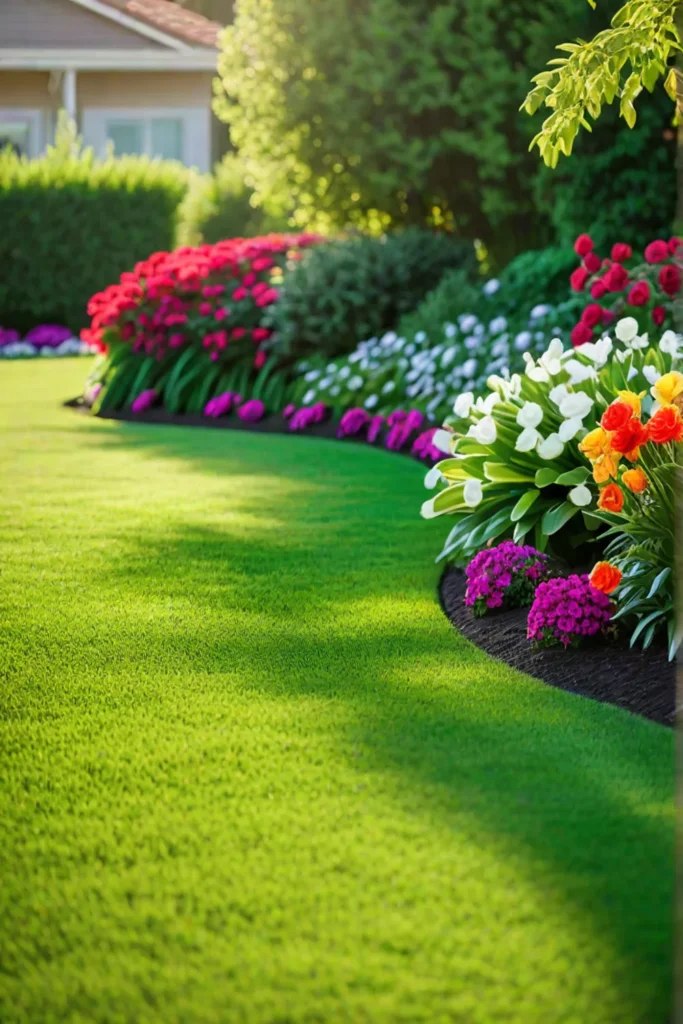
Choosing the Right Grass Type
What’s the secret to a lush, envy-inducing lawn? It starts with selecting the right grass type for your region and lifestyle. Trust me, as a lawn care enthusiast, I’ve learned this through trial and error.
Warm-Season Grasses
If you live in a warm, sunny climate, warm-season grasses like Bermuda and Zoysia are your best bet. These resilient grasses thrive in the heat and require less water than their cool-season counterparts. Bermuda grass, in particular, is a real trooper – it’s drought-tolerant and loves basking in the sun all day.
Cool-Season Grasses
For those of us in cooler regions, cool-season grasses like fescue and Kentucky bluegrass are the way to go. These grasses prefer milder temperatures and can handle a bit of shade. Kentucky bluegrass is a personal favorite of mine – it has a rich, emerald hue that’s simply stunning and an impressive ability to repair itself after wear and tear.
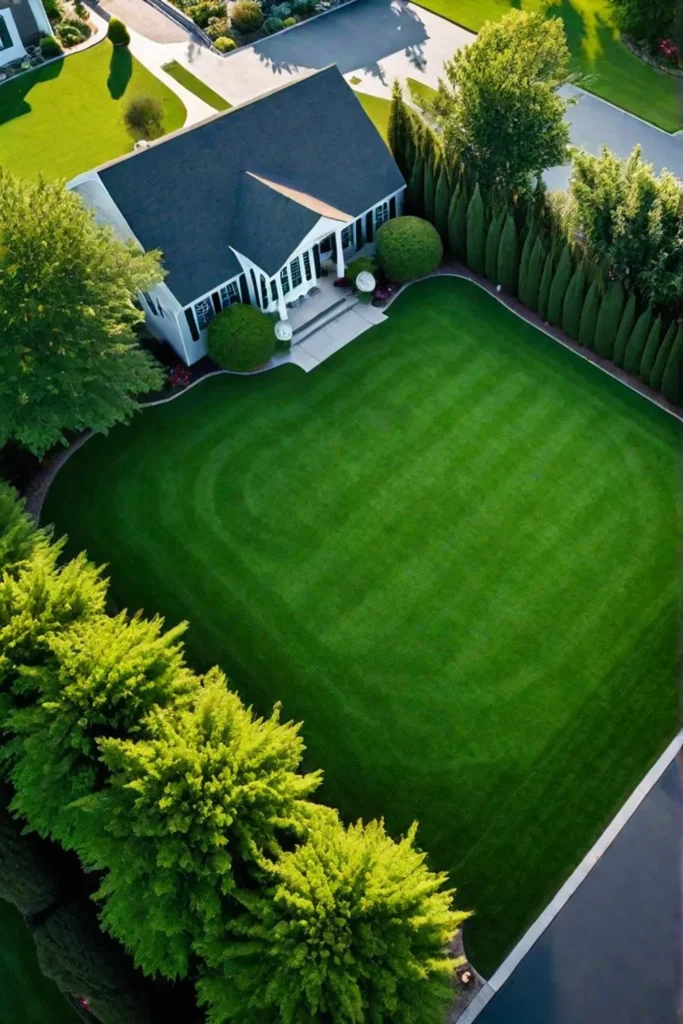
Lifestyle Considerations
But grass selection isn’t just about climate – it’s also about tailoring your lawn to your lifestyle. If you have an active family with kids and pets constantly running around, you’ll want a durable grass like perennial ryegrass or Zoysia to withstand heavy foot traffic. On the other hand, if you have shady areas in your yard, consider fine fescue or St. Augustine grass, which can tolerate lower light levels.
Choosing the right grass type is the foundation of a healthy, thriving lawn. Do your research, consider your climate and lifestyle, and don’t hesitate to ask your local nursery for recommendations specific to your region. You’ll be well on your way to lawn perfection with the right grass.

Speaking of foundations, the soil your grass grows in is just as important as the grass itself. Let’s talk about improving soil health in the next section.
Improving Soil Health
Is your lawn looking patchy and lackluster? The secret to a lush, thriving lawn lies beneath the surface – in the health of your soil! As a home decor and gardening expert, let me share some insider tips on nourishing your soil for a vibrant outdoor oasis.
Soil Testing and Amendments
The first step to soil success is understanding its unique composition. I recommend conducting a soil test to determine nutrient deficiencies and pH levels. Why is this important? Soil pH affects the availability of essential nutrients to your grassroots. With the test results, you can make targeted amendments to balance the pH and replenish any lacking nutrients.
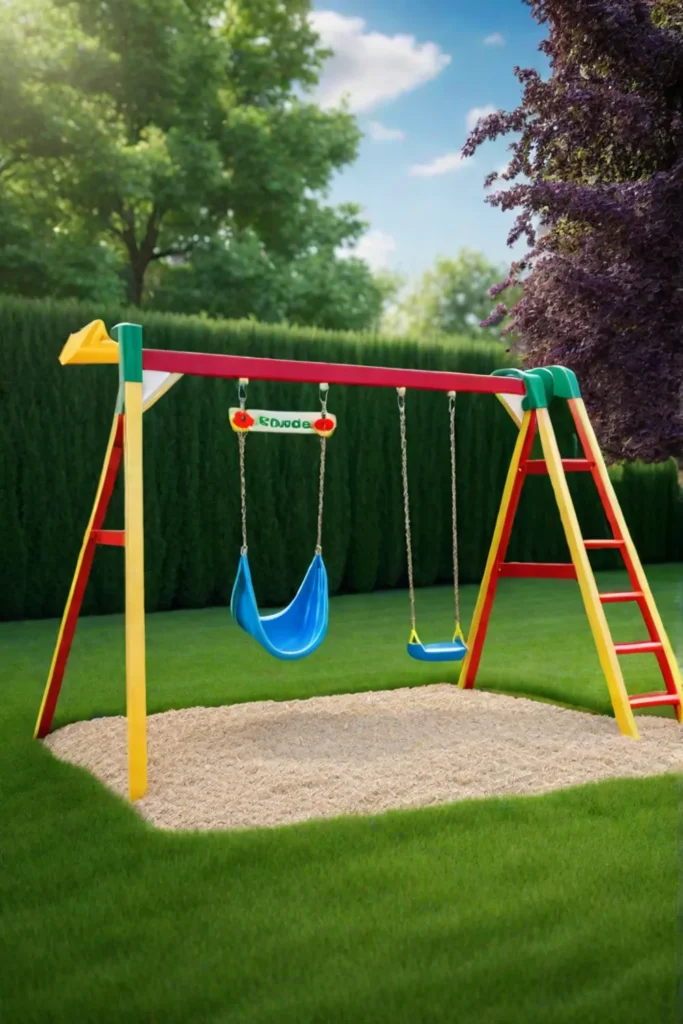
For instance, if your soil is too acidic, adding lime can raise the pH, while sulfur can help lower it for alkaline soils. Don’t worry; conducting a soil test is easy – you can pick up a testing kit from your local nursery or even send a sample to a lab for comprehensive analysis.
Organic Matter and Composting
Another key to soil health is incorporating organic matter, which acts like a multivitamin for your lawn. Compost, in particular, is a true miracle worker! It improves soil structure, drainage, and nutrient content, creating an ideal environment for your grassroots to thrive.
I love making compost at home using kitchen scraps and yard waste—it’s eco-friendly and cost-effective. You can incorporate the compost into your soil during planting or use it as a top dressing to boost nutrients.
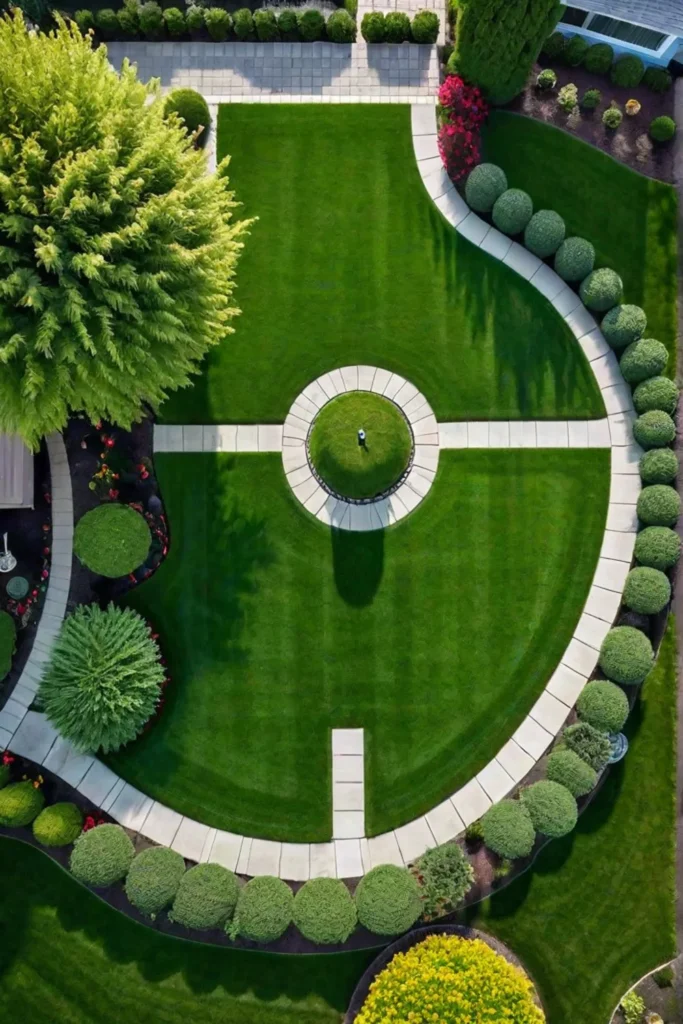
One of the best things about using organic fertilizers like compost is that they release nutrients slowly over time, providing a steady supply of nourishment for your lawn without the risk of burning the grass.
In summary, soil health is the foundation for a thriving backyard lawn. By testing your soil, making targeted amendments, and incorporating organic matter like compost, you’ll be well on your way to a lush, green oasis.
Regarding oases, proper watering techniques are also crucial for a healthy lawn. How do you ensure your grass gets its hydration without wasting water?
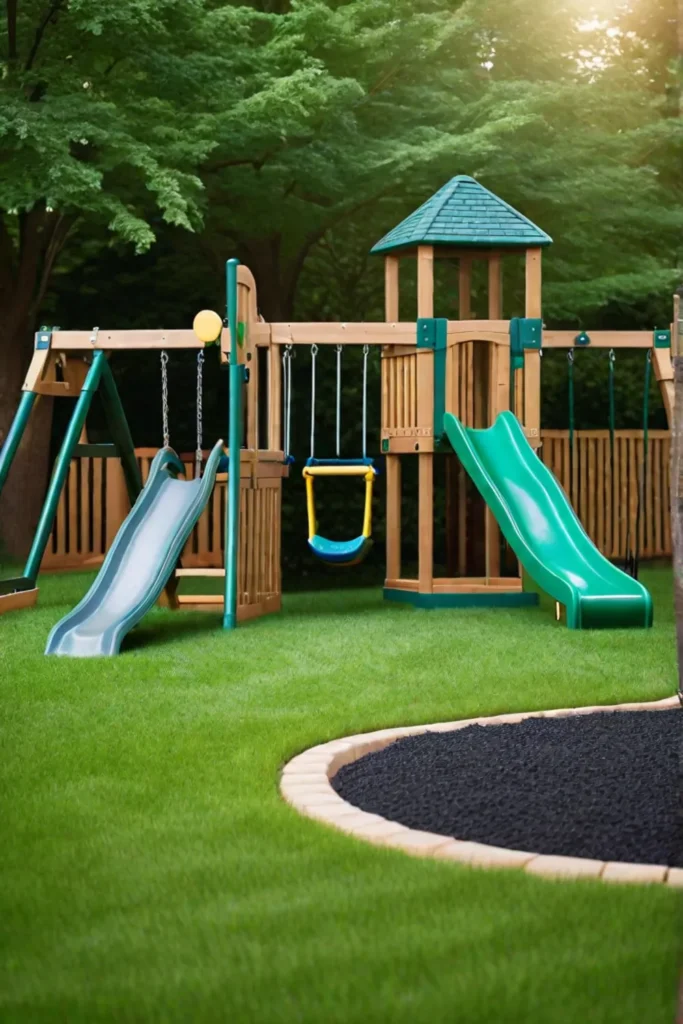
Implementing Effective Watering Techniques
Did you know that overwatering your lawn can be as harmful as underwatering? As a lawn care expert, I can’t stress enough the importance of getting your watering routine just right for a lush, thriving backyard oasis.
Watering Schedule and Frequency
The key to proper watering is to water deeply and infrequently. This encourages deep root growth, making your grass more drought-tolerant and resilient. Aim to water your lawn about once or twice a week, applying around 1-2 inches each time, depending on the weather conditions.
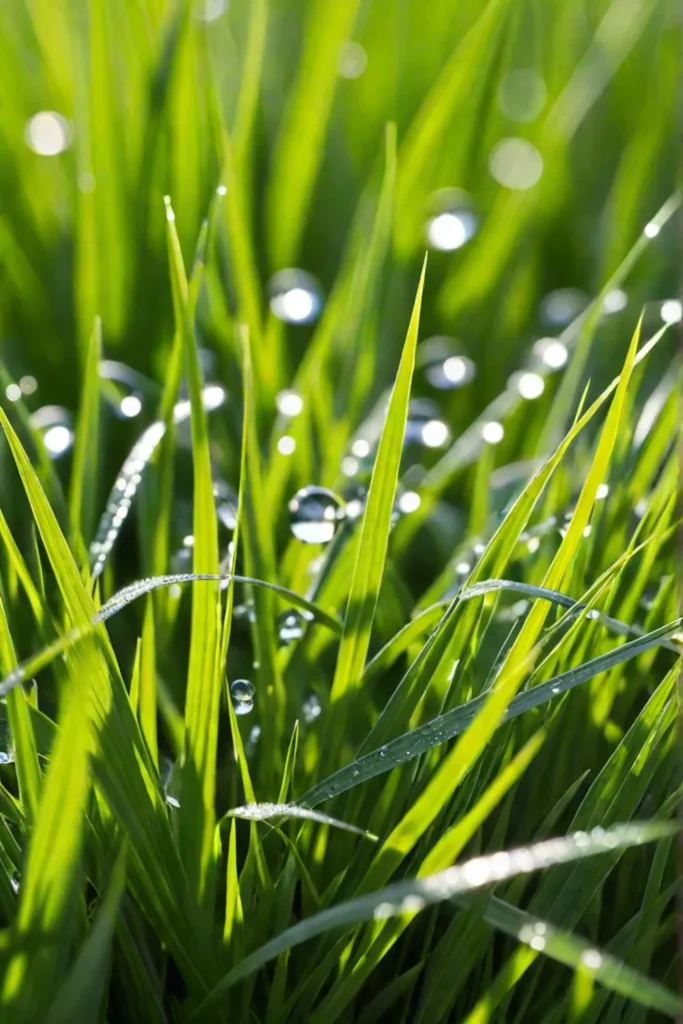
Watering Methods and Equipment
Early morning is the best time to water your lawn, as it allows the grass to dry before evening, reducing the risk of fungal diseases. Consider investing in a soaker hose or drip irrigation system for efficient water usage and even distribution. And don’t forget to use a rain gauge to track rainfall and adjust your watering schedule accordingly.
Signs of Over- and Underwatering
But how do you know if you’re overwatering or underwatering? Look for telltale signs. Overwatered lawns will have a spongy, soggy feel and may develop fungal diseases or weed problems. Underwatered lawns, on the other hand, will have a dull, grayish color, and the grass blades will start to curl or wilt.
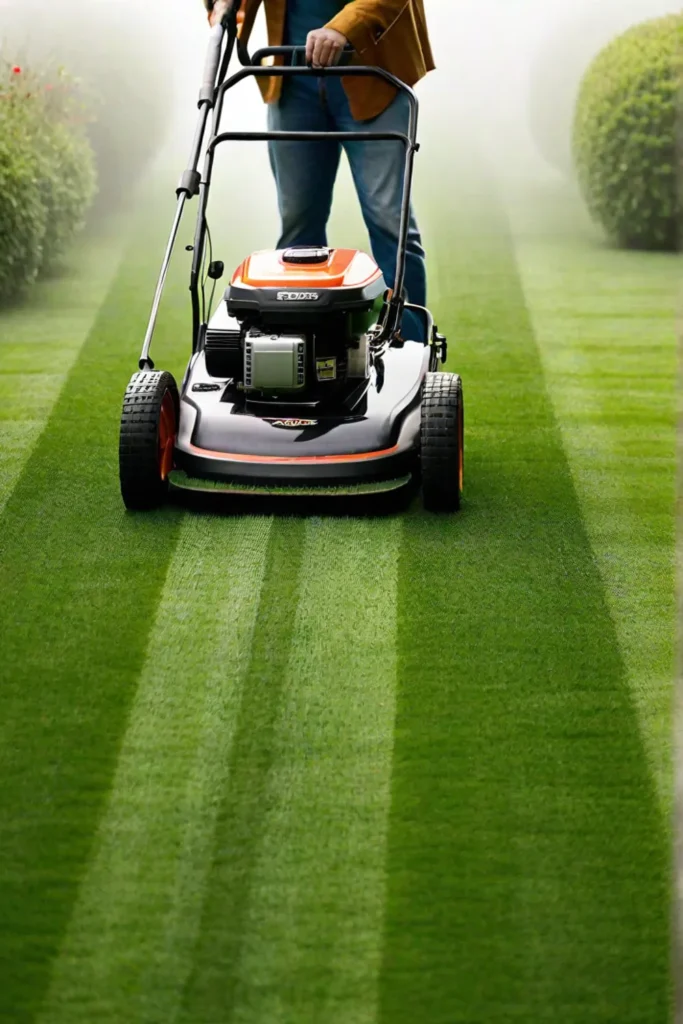
Efficient watering techniques conserve water and promote a healthy, resilient lawn. By adjusting your schedule based on weather conditions and using the right equipment, you’ll achieve that lush, green carpet you’ve always dreamed of.
Speaking of dreams, what’s your idea of the perfect backyard oasis? Is it a sprawling lawn with a cozy seating area or a garden filled with vibrant blooms? Whatever your vision, combating pests and diseases is crucial to maintaining a beautiful outdoor space.
Combating Pests and Diseases
Have you ever stepped outside to find unsightly brown patches marring your once-lush lawn? Don’t panic – these could be signs of pests or diseases, but you can restore your backyard oasis with the right approach.
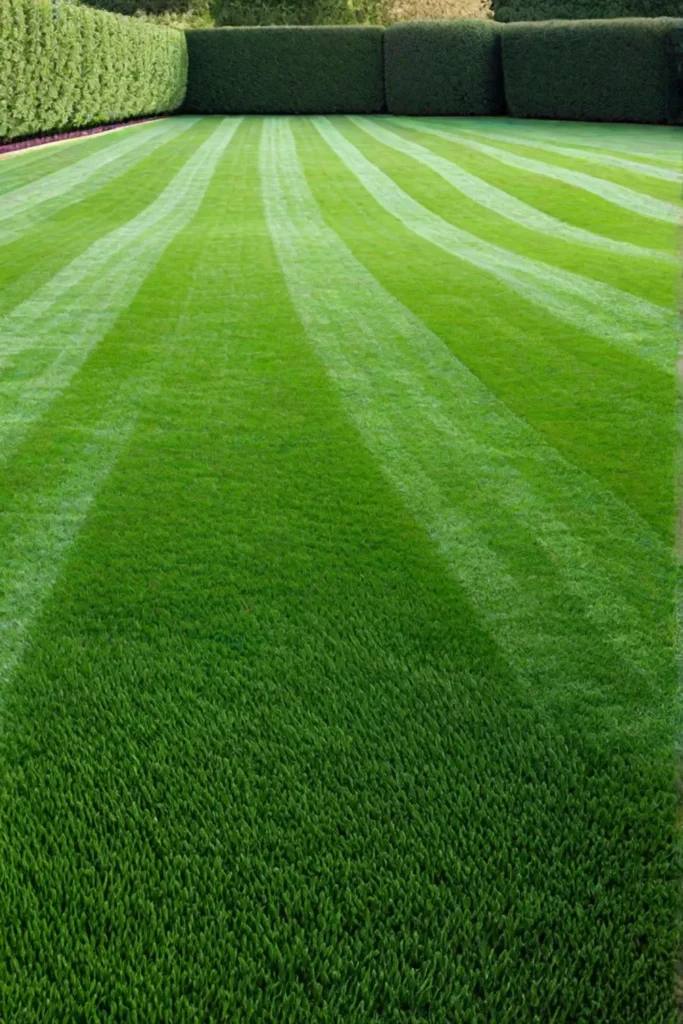
Common Lawn Pests
One of the most notorious culprits behind those pesky brown spots is the grub – those white, C-shaped larvae that feed on grass roots. Keep an eye out for irregular dead or dying grass patches, as this could indicate a grub infestation. But don’t worry, my friends, there are solutions!
A great way to combat grubs and other soil-dwelling pests is by introducing nematodes – tiny, beneficial organisms that prey on these unwanted guests. Apply them to your lawn according to the instructions, and let nature take its course.
Lawn Diseases and Treatment
Of course, pests aren’t the only threat to your lawn’s health. Fungal diseases like brown patches can also wreak havoc, causing circular patches of brown or dead grass. But fear not! With the proper fungicides and careful application, you can treat these issues and restore your lawn’s vibrant hue.

When identifying lawn pests and diseases, keep a watchful eye and trust your instincts. If something seems amiss, don’t hesitate to consult a professional or do some research to pinpoint the issue. And remember, preventative measures like proper mowing, watering, and fertilization can go a long way in minimizing pest and disease problems before they even start.
The key takeaways? Early detection and proper management are crucial for controlling pests and diseases, and preventative measures can be your best defense against these lawn invaders.

Speaking of defense, let’s transition to the next section on maintaining a healthy lawn – because a strong, resilient turf is your best ally in the battle against pests and diseases.
Maintaining a Healthy Lawn
As a passionate gardener, I can’t emphasize enough the importance of regular maintenance for a lush, thriving lawn. Like any living thing, your grass needs proper care and attention to flourish.
Mowing Techniques and Frequency
Mowing is more than just trimming the grass – it’s an art form that requires the right techniques. One of the golden rules is to never cut off more than one-third of the grass blade’s length in a single mowing. Doing so can stress the grass and leave it vulnerable to weeds and diseases. Always adjust your mower’s height based on your grass type and the season.

Fertilization and Weed Control
Feeding your lawn is crucial for maintaining its health and vigor. A well-balanced fertilizer provides your grass with the nutrients it needs to grow strong and lush. However, be cautious not to over-fertilize, as this can lead to excessive growth and even burn the grass. Additionally, keep an eye out for weeds and address them promptly with eco-friendly weed control methods.
Aeration and Overseeding
Aeration is like a deep breath for your lawn. Creating small holes in the soil allows air, water, and nutrients to penetrate deeper, more effectively reaching the grassroots. This process is especially beneficial for compacted soils and should be done at least once a year, preferably in the fall or spring when the grass is actively growing. Overseeding or spreading new grass seed over your lawn can help fill bare or thinning patches, resulting in a denser, more uniform turf.
As you can see, maintaining a healthy lawn requires a bit of effort, but the rewards are well worth it. With proper mowing, fertilization, and aeration, you’ll be on your way to a lush, envy-inducing backyard oasis.

Speaking of effort, don’t forget to tackle those pesky weeds! A well-timed weed control strategy can save you from hours of backbreaking labor.
Conclusion
As you can see, cultivating a stunning lawn is a labor of love that yields immense rewards. By following these tried-and-true techniques, you’ll be well on your way to creating an outdoor oasis that will envy your neighborhood. Remember, a beautiful lawn is more than just aesthetics – it’s a sanctuary where memories are made, laughter echoes, and bare feet can frolic freely.
So embrace the challenge, my friend, and let your lawn reflect your dedication and passion for green and growing. With patience, perseverance, and a little help from nature’s bounty, you’ll soon be basking in the glory of your very own backyard paradise.






